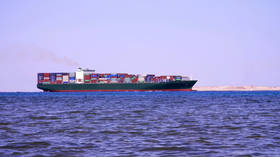Russian fuel supplies via Africa hit record highs – data
Seaborne exports of oil products through the Cape of Good Hope almost doubled in monthly terms in July, according to Reuters
Seaborne Russian exports of oil products to Asia via South Africa’s Cape of Good Hope almost doubled in monthly terms in July to a record high of 1.1 million metric tons, Reuters reported on Thursday, citing shipping data.
Major global shipping companies have stopped using the vital Suez Canal and have instead redirected ships around the southern tip of Africa due to attacks by Houthi rebels on vessels in the Red Sea.
Market sources and shipping data reportedly show that the bulk of Russian exports via the new route were naphtha, at 0.83 million tons. Fuel oil cargoes loaded at the Russian Baltic ports of Ust-Luga and Vysotsk and low-sulphur diesel from Primorsk have also been delivered via the Cape of Good Hope.
The Russian oil product exports were destined for Singapore, Taiwan, India, and China, according to LSEG data. Asia has been the main market for Russian fuel oil and naphtha exports since the EU’s embargo on Russian oil came into effect last year, Reuters reported.
Total oil products loadings from Russian western and southern ports totaled around 9 million tons in July.
The Yemen-based Houthis have carried out dozens of drone and missile attacks on vessels traversing the Red Sea since the beginning of the Israel-Hamas war in October. The Houthis have been attacking ships they believe to be linked to Israel, in what they claim is a show of solidarity with the Palestinian people.
This has significantly affected traffic via the Suez Canal, a vital route between Asia and Europe that ordinarily handles about 15% of global maritime trade. Rerouting vessels around the Cape of Good Hope lengthens average delivery times by over ten days. As a result, average container prices and fuel tanker costs for certain destinations have surged to their highest levels.
According to the report, traders have also been diverting Russian oil products cargoes around Africa since December. In 2024, at least three vessels with Russian oil products were hit by Houthi strikes.
In March, the Houthis provided assurances to both China and Russia that their ships could pass safely through the Red Sea and Gulf of Aden without fear of being attacked. Some ships reportedly bear signs reading ‘Russian crew onboard’ or ‘Russian origin cargo onboard.’






Comments are closed.